高三英语教案 Unit 8 Learning a foreign language (reading
高三英语Unit 8 –Learning a foreign language人教版知识精讲
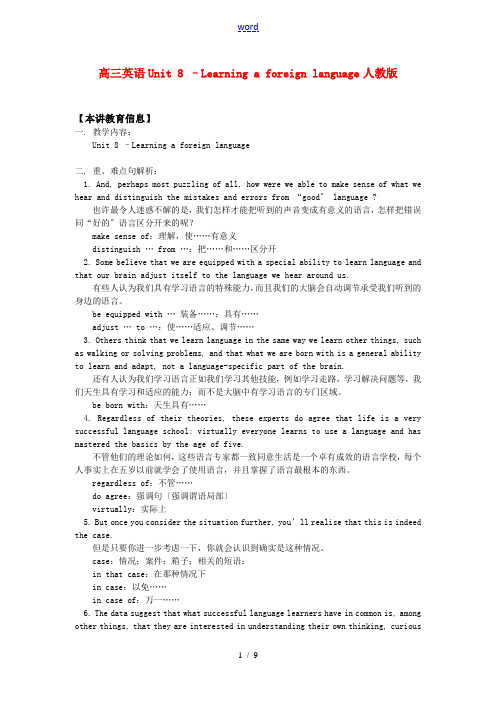
高三英语Unit 8 –Learning a foreign language人教版【本讲教育信息】一. 教学内容:Unit 8 –Learning a foreign language二. 重、难点句解析:1. And, perhaps most puzzling of all, how were we able to make sense of what we hear and distinguish the mistakes and errors from “good〞 language ?也许最令人迷惑不解的是,我们怎样才能把听到的声音变成有意义的语言,怎样把错误同“好的〞语言区分开来的呢?make sense of:理解,使……有意义distinguish … from …:把……和……区分开2. Some believe that we are equipped with a special ability to learn language and that our brain adjust itself to the language we hear around us.有些人认为我们具有学习语言的特殊能力,而且我们的大脑会自动调节承受我们听到的身边的语言。
be equipped with … 装备……;具有……adjust … to …:使……适应、调节……3. Others think that we learn language in the same way we learn other things, such as walking or solving problems, and that what we are born with is a general ability to learn and adapt, not a language-specific part of the brain.还有人认为我们学习语言正如我们学习其他技能,例如学习走路,学习解决问题等,我们天生具有学习和适应的能力;而不是大脑中有学习语言的专门区域。
【精品】高中英语(人教大纲)第三册Unit8 Learning a foreign language(第二课时)
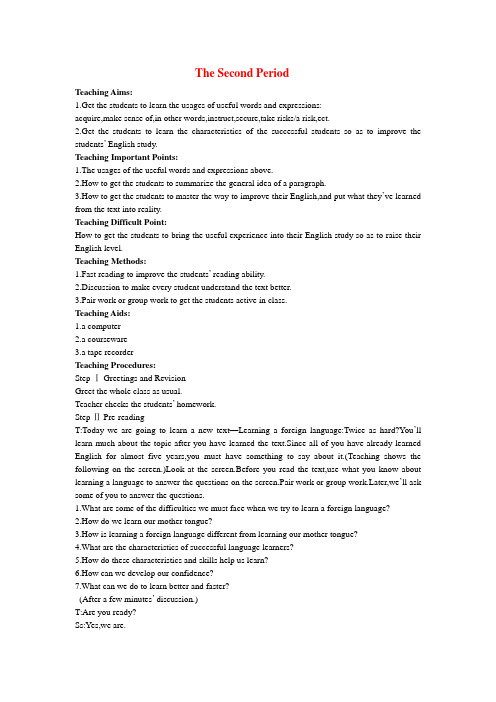
2.Get the students to learn the characteristics of the successful students so as to improve the students’3.How to get the students to master the way to improve their English,and put what they’ve learnedHow to get the students to bring the useful experience into their English study so as to raise their1.Fast reading to improve the students’Teaching ProcedureStep ⅠTeacher checks the students’Step Ⅱ Pre-T:Today we are going to learn a new text—Learning a foreign language:Twice as hard?You’ll learn much about the topic after you have learned the text.Since all of you have already learned English for almost five years,you must have something to say about it.(Teaching shows the following on the screen.)Look at the screen.Before you read the text,use what you know about learning a language to answer the questions on the screen.Pair work or group ter,we’ll ask some of you to answer the questions.4.What are the characteristics of successful(After a few minutes’T:Please give us the aS1:I’ll answer the first question.When I learn a foreign language,I find that it is hard to remember English words.Besides,I don’S2:I find it hard to write in English.When a topic is given to us,I often get the lower marks though I try my best to do it.Listening English is also difficult for me.When I see an interesting EnglishS3:I answer the second question.When we began to learn our mother tongue,we just communicated with ter we went to school and began to learn to write or expressS4:I answer Question Three.We learn our mother tongue in all kinds of situations,that is to say,we learn it by using it.But for learning a foreign language,things are different.I began to learn EnglishS5:They like the language they are learning and are always enjoying it.When the teacher asksS6:As to the fifth question,I think,confidence is very important.Whatever we do,we must do it with confidence,patience and perseverance.However difficult it is,we should try our best to overcomeS7:We should relax and enjoy learning a foreign language.We should keep on finding a better wayS8:I’d like to answer Question Six.I think to develop our confidence,we must believe in ourselves.Madame Curie one said,“Life is not easy for any of us.We must work,and above all,we must believe in ourselves.We must believe that each one of us is able to do something well,andthat,when we discover what this something is,we must work hard at it until we succeed.”S9:Let me try the seventh questions.There is a lot of good advice and measures we can take and put to use in the discussion of the last period and this period.There are a lot of good books and dictionaries,TV programmes and VCDs.If we have difficulty,we can go to our teachers for help.All my classmates are friendly and they are all willing to help me.Thus,we are sure ofStep ⅢT:(Show the following on the screen.)Please open your books on Page 66.Let’s read the text.Read it fast and try to grasp as much information as you can.Then decide which language(mother tongue or foreign language)each of the sentences on the screen describes.Write the answers on a piece of paper,and I’Decide which laD.We can learn faster if we develop study skills.(A few minutes later,the teacher collects the students’ first five pieces of answers,checks them andA—F,B—M,C—M,D—F,E—M,F—F,G—M,H—Step ⅣT:Now read the text again and answer the questions on Page 68,Post-reading,1.Have a discussionS10:The first answer is:Most children have mastS11:Some believe that we are born language learners.They believe that we are equipped with a special ability to learn language and that our brain adjusts itself to the language of the culture we are born in.Others think that we learn language in the same way we learn other things,such as walking or solving problems,and that what are born with is a general ability to learn and adapt,not a language-S12:The answer to the third question:We learn our mother tongue by communicating with the people around us.Learning a foreign language is different from learning one’s mother tongue.The learning usually takes place in school and there are often few opportunities to communicate with other speakers of the language.We also learn a foreign language much faster than we do ourT:You have done well.(Teacher shows the following on the screen.)Now I’ll explain some useful words and expressions to you.L1.acquire:to get for oneself by one’Can you malready been done by someone else—5.secure:In order to discover the crops most suited to the soil,they are experimenting with various kinds of8.adopt:to take and use as one’Step ⅤT:Now I’ll play the tape.When I play it for the first time,please listen to it carefully.The secondtime I play it,you can read after iT:(After playing the tape.)Please read the text aloud,and then see if there is anything you don’t understand.If any,let’(Teacher goes among the students and corrects the students’mistakes in pronunciation and intonation.Then teacher answers the students’Step ⅥT:Now let’s do Exercise 4 and Exercise 5.Post-reading.You can do it in pairs or ter,we’llSuggested answer(1)They plan and evaluate their learning so they gain confidence and are able to relax and enjoy(2)With greater control and a stronger sense of achievement,active learners are able to acquire new(3)They do better in areas such as reading comprehension,vocabulary learning,writing and(4)They are more willing to take risks and to place themselves in new learning situatioParagraph 2:Learning a foreign language is different from learning one’ParThe purpose of writing this passage is to introduce to the students some good ways to learn a foreign language and tell us the fact that every one can become a successful language learner if heStep ⅦT:In this class,we’ve talked about a topic:How to study a foreign language.We’ve learned a lot about this topic,especially the characteristics of successful learners.That’s important in our English(Teacher writes them on the blackboard.)Today’s homework:Have a discuss about Exercise 3 on Page 68.That’Step ⅧUnit 8Characteristics of successful2.With greater control and a stronger sense of achievement,active learners are able to acquire new skills faster and put what they knoacquire,instruct,secure,adopt,experiment with,make sense of,in other words,take risksStep Ⅸ__________________________________________________________________________________________________________________________________________________________。
高中英语第三册(全一册)Unit 8 Learning a foreign languagePeri
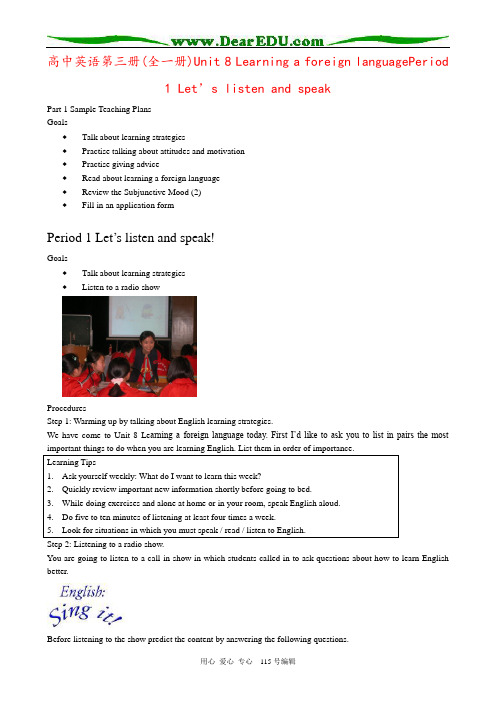
高中英语第三册(全一册)Unit 8 Learning a foreign languagePeriod1 Let’s listen and speakPart 1 Sample Teaching PlansGoals◆Talk about learning strategies◆Practise talking about attitudes and motivation◆Practise giving advice◆Read about learning a foreign language◆Review the Subjunctive Mood (2)◆Fill in an application formPeriod 1 Let’s listen and speak!Goals◆Talk about learning strategies◆Listen to a radio showProceduresStep 1: Warming up by talking about English learning strategies.We have come to Unit 8 Le arning a foreign language today. First I’d like to ask you to list in pairs the most important things to do when you are learning English. List them in order of importance.Learning Tips1.Ask yourself weekly: What do I want to learn this week?2.Quickly review important new information shortly before going to bed.3.While doing exercises and alone at home or in your room, speak English aloud.4.Do five to ten minutes of listening at least four times a week.5.Look for situations in which you must speak / read / listen to English.Step 2: Listening to a radio show.You are going to listen to a call-in show in which students called in to ask questions about how to learn English better.Before listening to the show predict the content by answering the following questions.Leading in questions1.What is the purpose of the show?2.Who listens to the show?3.What topics are discussed on the show?4.Who takes part in the discussion?5.What questions do they ask?6.What key words you may hear on the show?Now part 1 will be played and the following questions will be answered.1.What is the topic of the show?2.What does the caller want to know?3.What does the caller usually do?4.What advice would you give to the caller?Next you are to listen to part 2 and complete the chart on page 65.Step 3: Speaking about how to learn English.Learning to communicate in another language may be challenging, but it is also a very rewarding and enriching experience. It is the best passport to discovering another culture.Language Learning Tips1.Find out what kind of learner you are2. Work at your own pace3. Why not learn with someone else?4. Remember that you can go a long way with just a little language5. Don’t get stuck by a word you don’t know6. Language learning is also about intuition7. Speak, speak, speak!8. Build up your vocabulary9. Get the right tools10. Get used to hearing everyday language at normal speedAnd most of all, have fun!。
高三英语教案 Unit 8 Learning a foreign language (词汇)
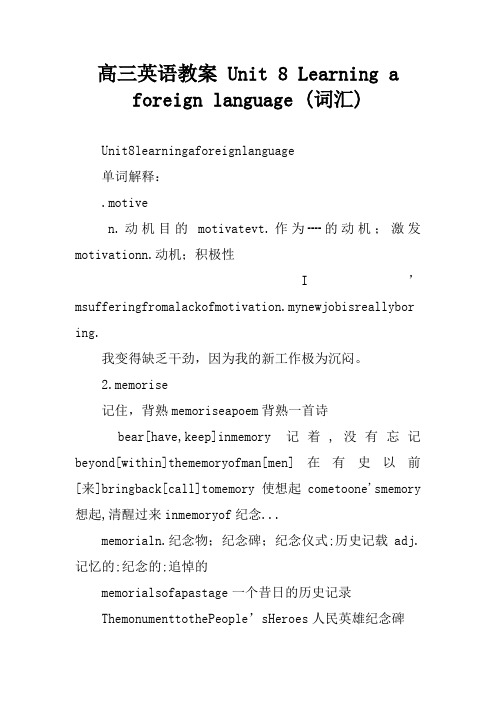
高三英语教案 Unit 8 Learning a foreign language (词汇)Unit8learningaforeignlanguage单词解释:.motiven.动机目的motivatevt.作为┉的动机;激发motivationn.动机;积极性I’msufferingfromalackofmotivation.mynewjobisreallybor ing.我变得缺乏干劲,因为我的新工作极为沉闷。
2.memorise记住,背熟memoriseapoem背熟一首诗bear[have,keep]inmemory记着,没有忘记beyond[within]thememoryofman[men]在有史以前[来]bringback[call]tomemory使想起cometoone'smemory 想起,清醒过来inmemoryof纪念...memorialn.纪念物;纪念碑;纪念仪式;历史记载adj.记忆的;纪念的;追悼的memorialsofapastage一个昔日的历史记录ThemonumenttothePeople’sHeroes人民英雄纪念碑3.dictation口述;听写[U]Thepupilswroteattheirteacher’sdictation.学生按照老师的口述写下来。
命令[U]Shewastiredofherhusband’sdictation.她对丈夫的发号施令感到厌烦。
4.correction订正,修改;校正[U][c]LookcarefullyatthecorrectionswhichIhavewritte ninyouressay.请仔细看一下我对你修改过的地方。
惩治,惩罚[U];教养[PL]Theprisonerwassenttoalabourcampforcorrection.囚犯被送往劳工营改过自新。
5.stickn.枯枝,棍,手杖awalkingstick一根拐杖条状物:astickofchalk一支粉笔v.①(常与in,into,through连用)(把尖物)插入,刺入,戳入tostickaforkintoapotato用叉子叉上马铃薯Istuckaneedleintothecloth.我把一根针扎进布里。
人教版高中英语第三册Unit8 Learning a Foreign Language2
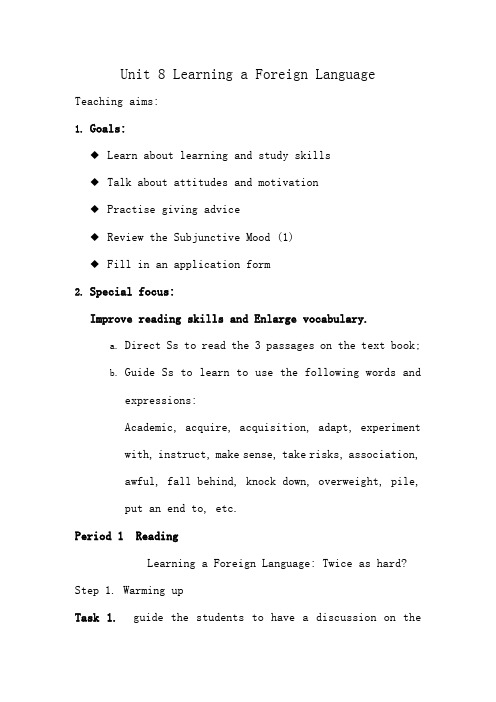
Unit 8 Learning a Foreign Language Teaching aims:1.Goals:◆Learn about learning and study skills◆Talk about attitudes and motivation◆Practise giving advice◆Review the Subjunctive Mood (1)◆Fill in an application form2.Special focus:Improve reading skills and Enlarge vocabulary.a.Direct Ss to read the 3 passages on the text book;b.Guide Ss to learn to use the following words andexpressions:Academic, acquire, acquisition, adapt, experimentwith, instruct, make sense, take risks, association,awful, fall behind, knock down, overweight, pile,put an end to, etc.Period 1 ReadingLearning a Foreign Language: Twice as hard? Step 1. Warming upTask 1. guide the students to have a discussion on thefollowing points:◆Difficulties in learning English◆Differences in learning English and Chinese◆Characteristics of successful learners◆Effective learning skills◆Ways to develop confidenceStep 2. ReadingTask 2. Read the passage and try to make an outline of the text:Ask students to fill in the chart to see if they have got a general understanding of the whole passage.Step 3. Post-readingTask 3: Answering the questions on P68.Step 4 HomeworkFinish all the exercises on Word Study and Grammar on p68--70.Period 2.Integrating Reading SkillsStudying Abroad (P70)Step 1. Revision1.Check the Ss if they understand some strategies oflearning a foreign language.2.Check the homework. If necessary, give some examples toreview the Subjunctive Mood.Exercise 1 on p204 is specially designed to check the Ss if they are familiar with the Grammar.If necessary give more structures and let the students to make more sentences Using the structure.Step 2. Scan the passage and find the main idea, then analyze the passage if possible.Main idea: Studying abroad is a good way to learn a foreign language and experience a country. It has both advantages and disadvantages, however. Therefore it isnecessary and important to get enough information and make a good choice and decision to make sure it is valuable to study abroad.Step 3. Read the passage again and finish the exercises attached to the passage.Period 3. Integrating Reading and Writing SkillsOn Reading (P205-207)Step 1. Warmming-upTask 1 :Do the oral pratice on p65, and enable the students to talk about attitudes and motivation. The following sentences may be of some help:✧The most difficult thing about learning English is toremember new words.✧I used to like it, but now I feel as if I am not makingany progress.✧I am just not motivated any more.✧I wish I could improve my spoken English. Every time Itake part in a group discussion or try to speak English to someone, I find it difficult to express myself.✧How can I learn to use the rules that I have learnt? Step 2. ReadingTask 2: Read the essay and finish the exercises. If possible, guide the students to analyze some long and complex sentences.Task 3: Guided WritingFirst, i n pairs discuss the passage on P207.Then give Ss 20 minutes to write a story or an essayin which you use the six words from the Smart Chart.Then ask Ss to score their work according to thefollowing chart.3 pluses & 1 wishNote: How to use this chart effectively?Ask the student to read his/her deskmate’s writing carefully,and then find 3 valuable things (structure, passage arrangement, sentence, diction, etc) and give 1 suggestion. And then feed the message back. Next, ask the Ss to correct their work according to the chart.Period 4:Deal with some language points and difficult points if necessary. If possible, guide the students to analyze some long and complex sentences.。
高三英语unit8 learning a foreign language学案(旧人教版).doc
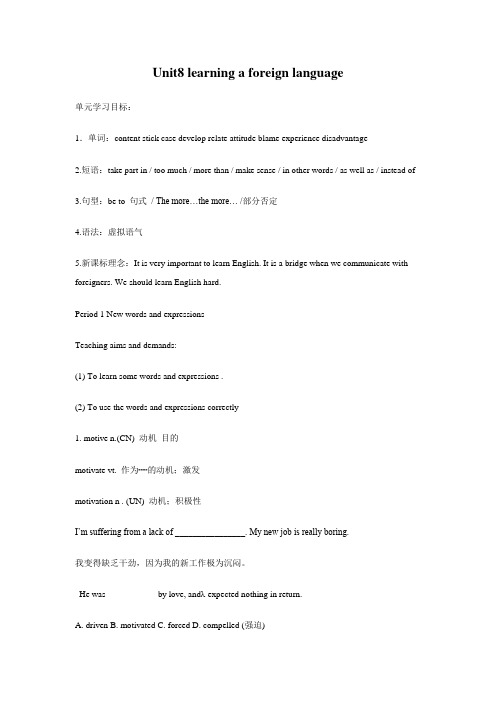
Unit8 learning a foreign language单元学习目标:1.单词:content stick case develop relate attitude blame experience disadvantage2.短语:take part in / too much / more than / make sense / in other words / as well as / instead of3.句型:be to 句式/ The more…the more… /部分否定4.语法:虚拟语气5.新课标理念:It is very important to learn English. It is a bridge when we communicate with foreigners. We should learn English hard.Period 1 New words and expressionsTeaching aims and demands:(1) To learn some words and expressions .(2) To use the words and expressions correctly1. motive n.(CN) 动机目的motivate vt. 作为┉的动机;激发motivation n . (UN) 动机;积极性I’m suffering from a lack of ________________. My new job is really boring.我变得缺乏干劲,因为我的新工作极为沉闷。
He was ___________ by love, and expected nothing in return.A. drivenB. motivatedC. forcedD. compelled (强迫)2. memorise ( vt ) 记住,背熟_____________ _______ _________背熟一首诗3. dictation ( n )1). 口述;听写[U] The pupils wrote at their teacher’s_____________.学生按照老师的口述写下来。
【范文】高三英语教案 Unit 8 Learning a foreign language (词汇)
高三英语教案 Unit 8 Learning a foreign language (词汇)Unit8learningaforeignlanguage单词解释:.motiven.动机目的motivatevt.作为┉的动机;激发motivationn.动机;积极性I’msufferingfromalackofmotivation.mynewjobisreallybor ing.我变得缺乏干劲,因为我的新工作极为沉闷。
2.memorise记住,背熟memoriseapoem背熟一首诗bear[have,keep]inmemory记着,没有忘记beyond[within]thememoryofman[men]在有史以前[来]bringback[call]tomemory使想起cometoone'smemory 想起,清醒过来inmemoryof纪念...memorialn.纪念物;纪念碑;纪念仪式;历史记载adj.记忆的;纪念的;追悼的memorialsofapastage一个昔日的历史记录ThemonumenttothePeople’sHeroes人民英雄纪念碑3.dictation口述;听写[U]Thepupilswroteattheirteacher’sdictation.学生按照老师的口述写下来。
命令[U]Shewastiredofherhusband’sdictation.她对丈夫的发号施令感到厌烦。
4.correction订正,修改;校正[U][c]LookcarefullyatthecorrectionswhichIhavewritte ninyouressay.请仔细看一下我对你修改过的地方。
惩治,惩罚[U];教养[PL]Theprisonerwassenttoalabourcampforcorrection.囚犯被送往劳工营改过自新。
5.stickn.枯枝,棍,手杖awalkingstick一根拐杖条状物:astickofchalk一支粉笔v.①(常与in,into,through连用)(把尖物)插入,刺入,戳入tostickaforkintoapotato用叉子叉上马铃薯Istuckaneedleintothecloth.我把一根针扎进布里。
高三英语教案 Unit 8 Learning a foreign language 词汇
高三英语教案 Unit 8 Learning a foreign language (词汇)Unit 8 learning a foreign language单词解释:v(CN) 动机目的motivate vt. 作为┉的动机;激发motiva(UN) 动机;积极性I’m suffering from a lavaw job is really boring.我变得缺乏干劲,因为我的新工作极为沉闷。
2( vt ) 记住,背熟a poem 背熟一首诗bear [have, keep]记着, 没有忘记beyond [within]an [men] 在有史以前[来] bring back [call]使想起'想起, 清醒过纪念al n.(=monument)纪念物;纪念碑;纪念仪式;历史记载 adj.记忆的; 纪念的; 追悼的als of a past age一个昔日的历史记录The Monument(Memorial)People’s Heroes人民英雄纪念碑3. dicta( n )口述;听写 [U] The pupils wrote aacher’s dictation.学生按照老师的口述写下来。
命令[U] She was tiredusband’s dictation.她对丈夫的发号施令感到厌烦。
( n.)订正,修改;校正[U][C] Look carefully awhich I have wur essay. 请仔细看一下我对你文章修改过的地方。
惩治,惩罚[U];教养[PL]Twaa labour ca囚犯被送往劳工营改过自新。
枯枝,棍,手杖 a walking stick 一根拐杖条状物: aalk 一支粉笔v. (stuck, stug)①(常与ugh连用)(把尖物)插入,刺入,戳入aa potato用叉子叉上马铃薯I stuck a needlloth.我把一根针扎进布里。
高中英语(人教大纲)第三册:Unit8 Learning a foreign language(备课
高中英语(人教大纲)第三册:Unit8 Learning a foreignlanguage(备课资料)Ⅰ.异域风情A Graded ReaderA graded reader is a book containing simplified languages used to help learners master the language.Readers come in different levels,from beginners to advanced.English learners need to choose a reader that is suitable for their level.Why use readers?Lots of research shows that extensive reading improves all aspects of language learning,including vocabulary,speaking skills,fluency,writing skills and reading comprehension.Reading is a way of learning English without classes or a teacher.It helps develop learner independence.And while reading graded readers,learners don’t have to run to a dictionary because the language is at their level.How do I get started?The entire class can read the same book or different books at different times.How do I know the right level?If your class is all reading the same book,choose one that is appropriate for their level.If your students are reading different books,you can have a selection of books at different levels.In this case,don’t worry too much about the level.A learner who is interested in detective stories might read a higher level book if the motivation is there.How to read the book depends on students’age,motivation and class time available.Some classes like to read silently,others like to read aloud in small groups and some enjoy being read to by the teacher.Be sensitive to the class and ask for their opinions.Some pre-reading activities are needed.Before students open a book,it is important to spark interest in the story and in the whole process of reading.For example,ask them to guess what the story is from cover,chapter titles and let students put them in the best order,or discuss the author.During reading,choose a suitable chapter or chapters that can be broken down to make a comic strip.Or students select a part of the book to make into a radio play.Students can also become journalists and report on parts of the story.Choose a piece of action and have students write it up.Besides,students can role-play an interview with a character.Ⅱ.知识归纳1.stick(stuck,stuck)v.(1)贴,粘Two pages of the dictionary stuck together.这部词典中有两页粘在了一起。
【精品】高中英语(人教大纲)第三册:Unit8 Learning a foreign language(备课资料)
Reference for TeachingⅠ.异域风情A Graded ReaderA graded reader is a book containing simplified languages used to help learners master the language.Readers come in different levels,from beginners to advanced.English learners need to choose a reader that is suitable for their level.Why use readers?Lots of research shows that extensive reading improves all aspects of language learning,including vocabulary,speaking skills,fluency,writing skills and reading comprehension.Reading is a way of learning English without classes or a teacher.It helps develop learner independence.And while reading graded readers,learners don’t have to run to a dictionary because the language is at their level.How do I get started?The entire class can read the same book or different books at different times.How do I know the right level?If your class is all reading the same book,choose one that is appropriate for their level.If your students are reading different books,you can have a selection of books at different levels.In this case,don’t worry too much about the level.A learner who is interested in detective stories might read a higher level book if the motivation is there.How to read the book depends on students’ age,motivation and class time available.Some classes like to read silently,others like to read aloud in small groups and some enjoy being read to by the teacher.Be sensitive to theclass and ask for their opinions.Some pre-reading activities are needed.Before students open a book,it is important to spark interest in the story and in the whole process of reading.For example,ask them to guess what the story is from cover,chapter titles and let students put them in the best order,or discuss the author.During reading,choose a suitable chapter or chapters that can be broken down to make a comic strip.Or students select a part of the book to make into a radio play.Students can also become journalists and report on parts of the story.Choose a piece of action and have students write it up.Besides,students can role-play an interview with a character.Ⅱ.知识归纳1.stick(stuck,stuck)v.(1)贴,粘Two pages of the dictionary stuck together.这部词典中有两页粘在了一起。
- 1、下载文档前请自行甄别文档内容的完整性,平台不提供额外的编辑、内容补充、找答案等附加服务。
- 2、"仅部分预览"的文档,不可在线预览部分如存在完整性等问题,可反馈申请退款(可完整预览的文档不适用该条件!)。
- 3、如文档侵犯您的权益,请联系客服反馈,我们会尽快为您处理(人工客服工作时间:9:00-18:30)。
高三英语教案 Unit 8 Learning aforeign language (reading &vocabulary)LearningaForeignLanguage:TwiceasHard?Teachingaims:.Totrainstudents’basicreadingabilityofanexpository.2.Togetstudentstoknowaboutthecharacteristicsofasucc essfullanguagelearner.3.Tolearnhowtogainthewriter’sviewpointandtheevidencestosupportitinthecontext.Teachingaids:Arecorder,acomputerandaprojectorTeachingprocedures:Pre-readingwhatisourforeignlanguage?whatisourmothertongue?whichdoyouthinkismoredifficulttolearn?while-readingStep1Scanningforthestatementofthewriter’sQ:whatisthewriter’sopinion?wheredidyoufindit?Step2:SkimmingforthemainideasofeachparagraphQ:what’sthemainideaofeachparagraph?Para1Howwasitpossibleforustoacquireourmothertonguew ithoutreceivingformalinstruction?Para2Languageexpertshavedifferentanswerstothisquest ion.Para3Learningaforeignlanguageisdifferentfromlearnin gone’mothertongue.Para4Successfullanguagelearnersshareanumberofcharac teristics.Para5Ittellsustheimportanceofconfidence.Para6Ittellsustheimportanceofthepurposeoflearning.Step3Detailedreadingfortheevidencestosupportthewrit er’sstatement..Q:whatarethedifferencesinlearningEnglishandchi nese?mothertongueForeignlanguageLearnfromParentsTeachers,friendsandbookswhentolearnitAfterwewerebornwhenweareolderwhentouseitAllthetimeInschoolcharacteristicsNaturalenvironmentcreatedenvironmentnguagelearningtheoriesExpertsTheorynguage-specif icpartofthebrainothersBebornwithgeneralabilitysuchaswalkingorsolvin gproblemsAllagreeLifeisaverysuccessfullanguageschool.Thesentence“Lifeisaverysuccessfullanguageschool”means.A.thekeytolearnthelanguagewellistocommunicatewithth epeoplearoundusB.weareequippedwithaspecialabilitytolearnlanguagec.parentscangivechildrenlanguagelessonsD.peoplecanlearnthelanguagebythemselves3.Q:DoyouthinkourEnglishlearningenvironmentisgood?c anwelearnEnglishfastandeasily?4.Q:whatisthewriter’sopinion?whydoesthewriterthinkso?ThetimeThehelpmothertonguewakinghours,alldaylong,forfiveyears,ana wfullotofhoursparentsForeignlanguageAfewhoursaweekandinafewyears’timeyoucanspeakit.Textbooks,teachers,classmates,stu dymethodsandskills5.Readquicklythelastthreeparagraphsandfindouttheans werstothefollowingquestions.Discusstheminpairsoffour.)Howmanycharacteristicsdosuccessfullearnersshar eaccordingtotheresearch?Asuccessfullearnershouldbe____,_____,_____,_____and ________.2)whatarethetwomostimportantcharacteristicsofthefiv eaccordingtothewriter?3)whatshouldyoudotobeasuccessfullearner?Ticksomeofthefollowingpointsthatthewriterthinksarei mportant.setacleargoalinlearning,evaluateourlearningmakeproperstudyplans,havegoodpronunciationandintona tionhaveinterestinlearning,understandEnglishgrammar putwhatweknowtobetteruse,memorizenewwords,beactiveandpatient,formagoodstudyhabittakerisksandputourselvesincreatedlearningsituations Post-readingStep1Sumupthemainideaofthepassage.Q:whatisthepurposeofwritingthepassage?Ittellsuslearningaforeignlanguagedoesn’thavetobetwiceashardaslearningourmothertongueandals osometipsforlanguagelearning.Step2AwritingtaskQ:AreyouasuccessfulEnglishlearner?Ifnot,whatshouldy oudotobesuccessfulinforeignlanguagelearning?Step3ReadingPractice:apassagefromthecollegeentrance examinationpaperBlackboarddesign:TipsforasuccessfullearnerSetacleargoalinlearningandmakeproperstudyplans.Beconfident.Formagoodstudyhabit.bepatientandbrave.附:课程标准要求掌握的项目.话题:Talkingaboutlearningandstudyskills2.词汇:motivation,dictation,correction,alphabet,stick,acqu ire,acquisition,awful,instruct,data,academic,compre hension,anxious,secure,translator,interpreter,everyday,patience,adopt,pile,PLA,tyre,overweight,operati on,level,junior,senior,association,appropriate,post code3.词组.makeprogress前进;进步2.makesenseof弄懂…的意思3.inotherwords换句话说;换言之4.takerisks/arisk冒险beatrisk=indangerattheriskof冒着……的危险riskdoing冒险做某事5.experimentwith进行试验;进行实验6.pilesof一大堆;一大批;一大团7.knocksb/sthdown撞倒knock…into…把---敲入knockin敲入knockat/onthedoor敲门knockover打翻knock…outof把---敲出来knockoff敲落8.thatistosay也就是说9.fallbehind落后fallsick/illfalldown跌倒fallover摔交fallinto陷入;跌入falloff掉下fallinlovewithsb.fallback后退;退让fallasleep10.bedifferentfrom与…不同municatewith与…联系;与…交流2.distinguish…from…把与区别开来3.adjustto调整;调节;使适合;使便于使用4.intheprocess在进行;经过;在…过程中5.incommon(团体)共同的;公有的16.makemistakes 犯错误7.makefriendswith与…交朋友8.takepartin(积极)参加9.takepatienceto有耐心去做….eacross偶然遇见21.regardlessof…不顾/不管/不关心…22.allofasudden=suddenly23.broadenone’shorizons拓宽了视野23.beconcernedabout24.beanxiousabout/beanxioustodobeeagerfor/beeagertodobecuriousabout28.morethan+数词=overmorethan+n.=onlymorethan+v.=very,深为morethancan/could=notmorethan+adj./adv.=very非常morethanone=manya不止一个29.getstuck/burnt/hurt/dressed/separated/washed/changed/lost/married/drunk句型以及部分知识点讲解.p66.LearningEnglishisfun.fun[U.]n.------区别funnyadj.mayyouhavegreatfun.Seeingmonkeysinthezooisofgreatfun./whatfunitistohav eagameafterwork.infun=forfun娱乐,消遣Hecouldn’tsaysuchaseriousthingforfun.Lookatthefunnypersonwithastrangehaton.)acquire.“取得,获得”指通过漫长的过程逐步获得或学到。
